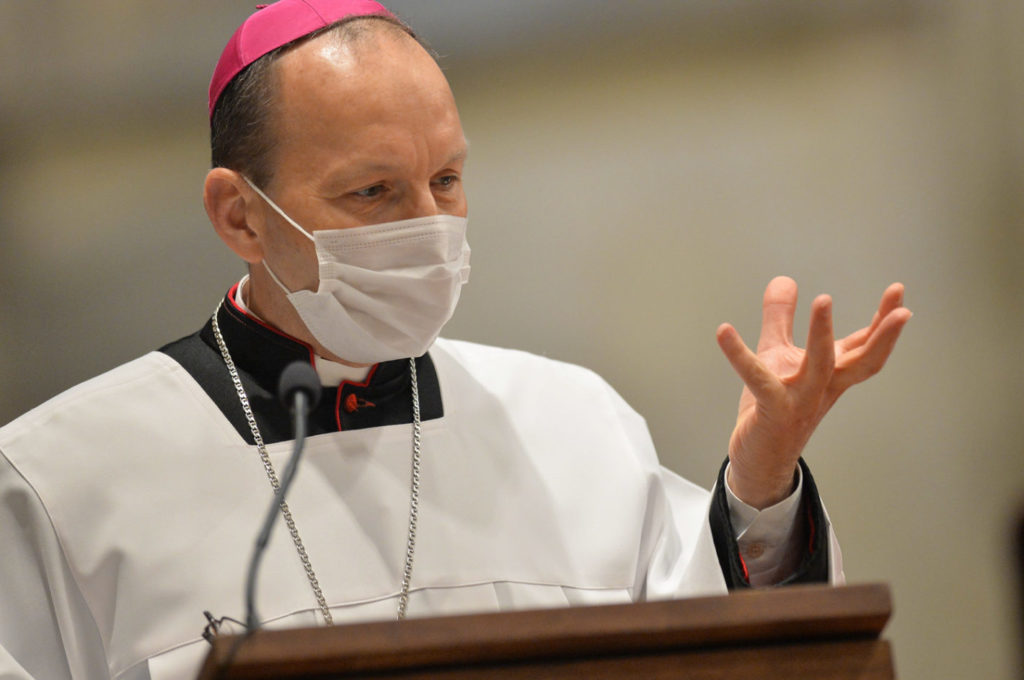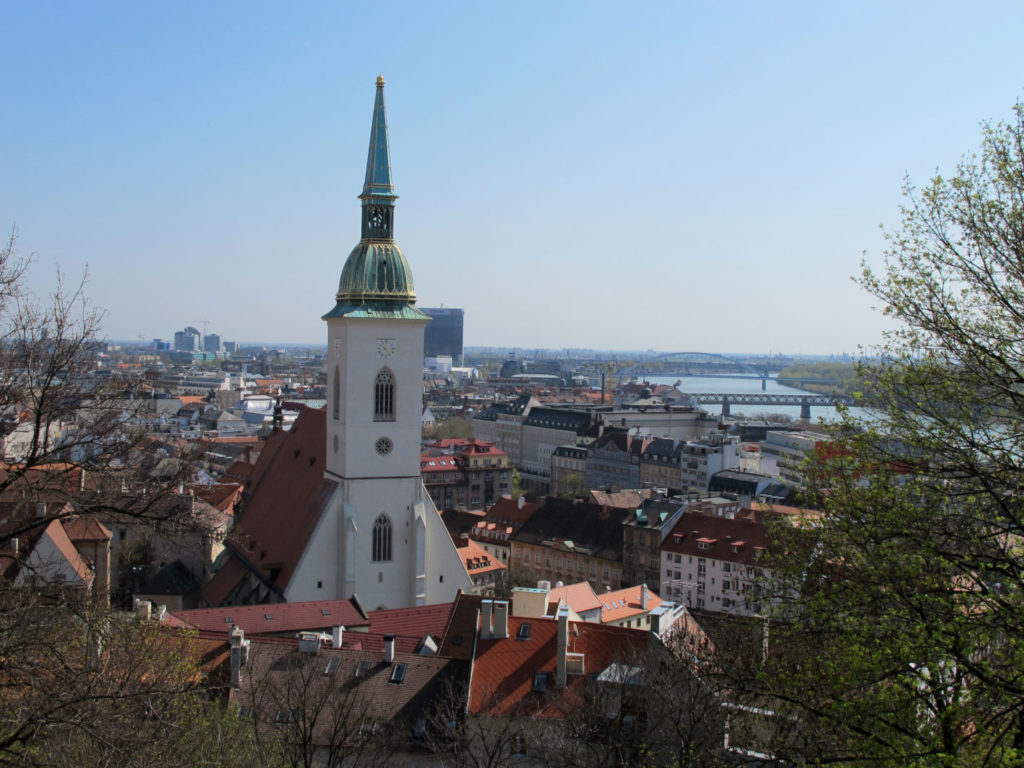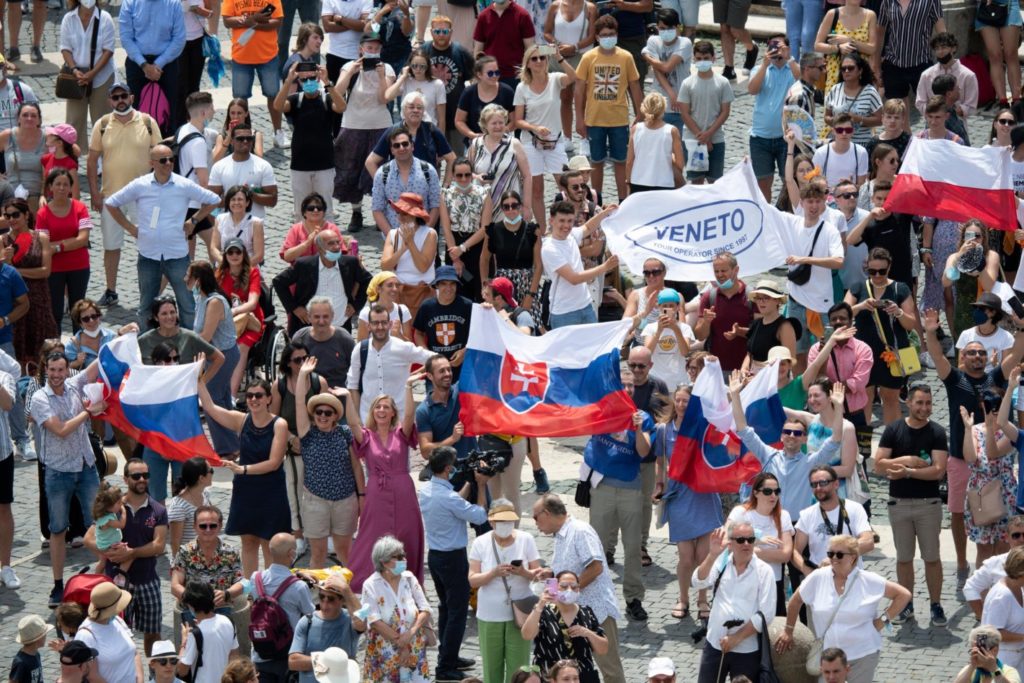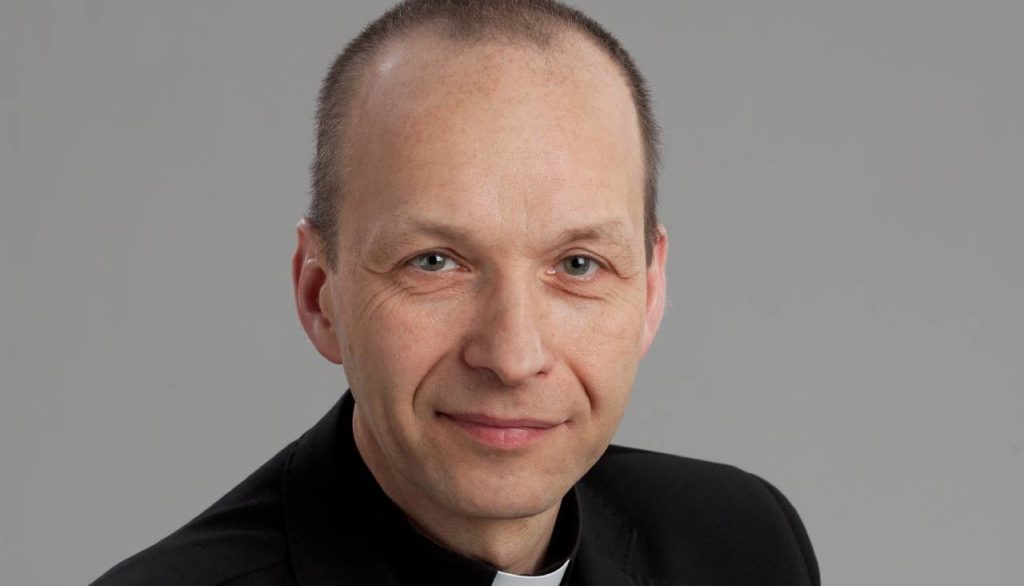"From September 12 to 15 next, God willing, I will go to Slovakia for a Pastoral Visit," Pope Francis announced. "I will first concelebrate in Budapest the concluding Mass of the International Eucharistic Congress," the Pope added. "I heartily thank all those who are preparing for this trip and I pray for them. We all pray for this trip and for the people who are working to organize it."
On the occasion of this trip, which marks Pope Francis' second after the COVID-19 pandemic, after visiting Iraq in a historic trip, Omnes talks with Bishop Jozef Haľko, auxiliary bishop of Bratislava, Slovakia.
Did the announcement of the Pope's visit come as a surprise to Slovaks? Not long ago it seemed unrealistic to think about this possibility....
We were not only surprised by the announcement of the visit, but also by its duration, since it will last for three days. However, there was no time to remain in surprise, because it was necessary to get down to work immediately so that the visit would go as well as possible and, above all, produce good spiritual fruits.
St. John Paul II visited Slovakia briefly in 1990, before the country's independence, and then twice more, in 1995 and 2003. This will be the fourth visit by a pope.
The three visits of Pope St. John Paul II have been indelibly engraved in the history of the new post-communist Slovakia.
It is interesting to remember that already during communism, in the 1980s, a large signature campaign was conducted to invite Pope John Paul II to come to Slovakia. The communists reacted very irritated, but the signatures reached Pope John Paul II anyway, and he was moved.

Not so long ago, until 1989, Slovakia was under communist totalitarianism. Society has changed a lot since then. What are the challenges for the Church today?
The challenges of the Church today are to build a healthy society, based on a healthy and strong family, in which children are educated according to the normal traditional values. At the same time, it is very important to face the various experiments in the field of relationships in the family, in couples, in children. The evangelization of the younger generations, including through social networks, is also a great challenge.
The challenge of the Church today is to build a healthy society, based on a healthy and strong family, in which children are educated according to normal traditional values.
Monsignor Jozef HaľkoAuxiliary Bishop of Bratislava
The motto of the papal visit is: "With Mary and Joseph on the way to Jesus". Can you explain it?
The motto of the Pope's visit is inspired by the Marian devotion, which is widespread in Slovakia, and by the Year of St. Joseph that has been proclaimed, while the fundamental objective of the visit of the Bishop of Rome, the Pope and Supreme Pastor of the Church remains the deepening of faith in Jesus Christ as our personal Savior, our Redeemer and Protector.
The fundamental objective of the visit of the Bishop of Rome, the Pope and Supreme Pastor of the Church is the deepening of faith in Jesus Christ as our Savior.
Monsignor Jozef HaľkoAuxiliary Bishop of Bratislava
Marian devotion is expressed, for example, in the patron saint of the country, Our Lady of the Seven Sorrows, venerated in Šaštín. What is the significance of the Pope's presence at the September 15 pilgrimage?
The Pope's visit to Šaštín, and his presence at the national Marian shrine of the Vigren of the Seven Sorrows, has a profound message, with various aspects: there we will pray together in union with the successor of St. Peter, in the awareness that we have only one Mother, who is therefore "Mother of the Church", the Mother of the Seven Sorrows. And so there we will experience in a very special way a communion based on Marian piety, which is the surest way to Jesus.
An index of vitality is the high number of people who go to the sacrament of confession, or the many young people who attend Mass on weekdays. The Pope will meet with young people in Košice on September 14. What fruits do you expect?
The young generation is very receptive, and also critical. At the same time, they are searching for the meaning of their lives, and perhaps never before have they been subjected to the pressure of so many alternative offers in this regard. That is why the solemn voice of the High Priest, Pope Francis, will also be very important for them. There is an enormous spiritual potential in Slovak youth, and it is important not only to grasp and awaken it, but also to develop it steadily.
There is enormous spiritual potential in Slovak youth, and it is important not only to capture and awaken it, but also to develop it steadily.
Monsignor Jozef HaľkoAuxiliary Bishop of Bratislava
The Pope will meet with priests, religious and catechists in Bratislava. In the first years after the fall of communism, the number of vocations was relatively high. What is the situation of vocation ministry now?
Vocation ministry requires constant attention to young people at all levels of contact that life naturally brings them. Vocation ministry is unthinkable without family ministry, without pastoral care and evangelization also in social networks, which are the contact platforms of today's youth. For example, of great importance are the altar boy camps organized by the seminarians and supported by the dioceses. There, the boys see young men, close to them in age, who have already decided to take the step, study theology and prepare themselves spiritually for the priesthood.

A peculiarity of Slovakia is the presence of a significant number of Greek Catholics; historical reasons have made Slovakia as a bridge between East and West, but always linked to Rome. Francis will meet with Greek Catholics in Prešov.
Already at a meeting in Rome Pope Francis invited the Slovak Greek Catholics to preserve and maintain their identity, including their specific Byzantine rite. Undoubtedly the meeting in Slovakia will continue along these lines, and that will be a great satisfaction for the Greek Catholics who in the communist era were persecuted and excluded for 18 years: they were not allowed to exist.
The meeting with the Gypsy minority in the Luník IX neighborhood will take the Pope to one of the main "peripheries" of Slovak society, and to an important pastoral challenge.
The Pope invites the Gypsies to become a gift to society with their culture, to receive at the same time all the positive aspects of the society in which they live. The Pope's presence at the Luník in Košice will also be a great encouragement for those who work every day to care for the Gypsies.
Bratislava, the capital, has its own particular features. What are the priorities of the archdiocese?
The evangelization of Bratislava, both as a capital and as a large city, certainly has its peculiar aspects.
It is important that Catholics, in all areas of civil life, give open witness to the living Christ, that his Gospel can be lived in everyday reality. The city, of course, presupposes the evangelization of student environments, of business environments, of the political environment. The Gospel has in itself the power to inspire every sphere of social life.
Is the Pope's visit related to the International Eucharistic Congress in Budapest, from where the Holy Father will come to Slovakia?
It is possible to note a certain symmetry between the events of the Eucharistic Congress in Budapest and the Pope's visit to Slovakia. Because the Eucharistic Congress in Budapest will deal with the themes of the Gypsies, the Jews, the peripheries, the youth, in relation to the Eucharist, and all of them are the subject of various meetings of the Pope in Slovakia. The fact that the Pope will close the Eucharistic Congress with a solemn Holy Mass, from which he will immediately leave for Slovakia, creates a very inspiring link between the two events.
You are responsible for the spiritual preparation for the Holy Father's visit. What is that preparation like?
The main goal of spiritual preparation is to experience the Pope's presence in Slovakia as a highly spiritual event, after which we will have been strengthened in faith by the successor of St. Peter. With the help of spiritual preparation, we are, so to speak, "tuning in" to the "wavelengths" of Pope Francis, in order to be able to listen to him attentively, without being distracted by irrelevant or less relevant issues, and to desire to be strengthened in faith, in our personal faith in Jesus Christ.

The bishops have proposed three prayer intentions in preparation for the visit: for the Pope, for the Church in Slovakia and for all people on earth.
Of course, prayer is an essential and indispensable element of preparation, because without it we really "can do nothing," as Jesus himself says. These three prayers have their logic: we pray for the one who will come; we pray for those to whom he will come; and, finally, we pray for all people, because every visit of the Roman Pontiff, that is, of the bridge-builder, is also to build bridges in human relations and to build the great family of Christ's faithful.
To prepare ourselves, we pray for the one who will come; we pray for those to whom he will come; and, finally, we pray for all men, because every visit of the Roman Pontiff is also to build bridges in human relations and to build the great family of Christ's faithful.
Monsignor Jozef HaľkoAuxiliary Bishop of Bratislava
Regarding the future of Catholicism in the country, in a pastoral letter the bishops invited us to ask ourselves two questions: "What does Slovakia look like today? Allow me to ask you those same questions....
These two questions are inseparable, and constitute the dynamics of the spiritual development of each individual and of society as a whole. For if we do not truly call reality by its name, including mistakes, failures and shortcomings, we cannot adequately move forward into the future, in the effort to improve and deepen what has gone wrong.
When Jesus said to the rich young man: "You still lack something," he repeats the same thing to all of us today. We cannot remain stuck in lethargy and passivity, but - as Pope Francis says - we have to be able to dream. And we have to be able to make dreams gradually disappear, making them come true.
Pope's program in Slovakia
Sunday, September 12
15:30 Arrival in Bratislava from Budapest, and official reception
16:30 Ecumenical meeting at the Apostolic Nunciature
17:30 Private meeting with members of the Society of Jesus
Monday, September 13
9:15 Welcome Ceremony (Presidential Palace, Bratislava)
9:30 Courtesy visit to the President of the Republic
10:00 Meeting with representatives of the State, civil society and the diplomatic corps (presidential palace)
10:45 Meeting with bishops, priests, consecrated persons, seminarians and catechists at St. Martin's Cathedral, Bratislava
16:00 Private visit to the Betlehem Center, Bratislava
16:45 Meeting with the Jewish community at Rybné námestie Square, Bratislava
18:00 Meeting with the Speaker of Parliament at the Apostolic Nunciature
18:15 Meeting with the president of the government at the Apostolic Nunciature
Tuesday, September 14th
9:00 Arrival by plane to Košice
10:30 Divine Liturgy of St. John Chrysostom in the municipal sports hall in Prešov
16:00 Meeting with the Roma community at Luník IX. in Košice
17:00 Meeting with young people at the Lokomotíva stadium in Košice
18:30 Departure to Bratislava
Wednesday, September 15
9:10 a.m. Prayer meeting with bishops at the national shrine in Šaštín
10:00 Holy Mass in the open air at the sanctuary of Šaštín
13:30 Farewell ceremony at the airport and departure to Rome.







